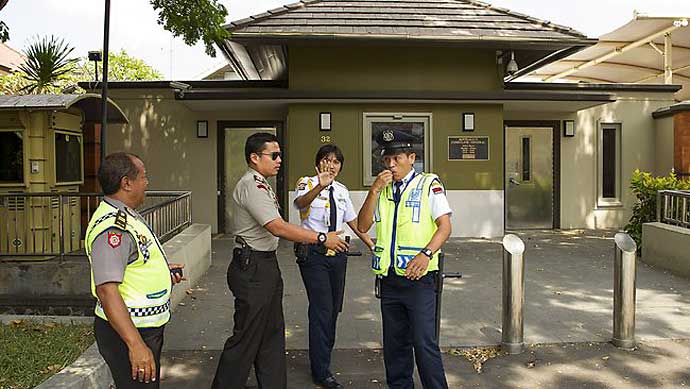Australian government crossbench support for West Papuans
Free West Papua Movement Menu

Indonesian Police outside the Australian consulate in Bali yesterday after West Papuan activists scaled its wall.
SBS Report: 7 October 2013
Rowan Callick, Deborah Cassrels with additional reporting from Sarah Martin
The Australian 7 October 2013
Crossbench politicians are demanding that the Abbott government back the calls of three West Papuan activists who in the early hours of yesterday morning scaled the wall of the Australian consulate in Bali -- and left soon afterwards in controversial circumstances.
They had quit the consulate by 8am, defusing a potentially awkward distraction for Tony Abbott who is attending the APEC summit in Bali today.
But independent senator Nick Xenophon said the students were forced to leave after being warned by a consular official that the Indonesian police would otherwise be called to arrest and remove them.
The student activists, Rofinus Yanggam, Markus Jerewon, and Yuvensius Goo, called for at least 55 political prisoners in the Indonesian provinces of Papua and West Papua to be freed and that international journalists should be allowed to report there without restrictions.
Mr Yanggam said before scaling the wall: "I want to see West Papuans treated like Balinese. I don't want to see West Papua always kept closed from international visitors."
The three are members of the Alliance of Papuan Students in Java and Bali, whose co-ordinator Rinto Kogoya said that Mr Abbott and other leaders at APEC should join the call for the release of political prisoners in Indonesia.
Senator Xenophon said: "I am really worried about the safety of these guys. The Australian government saying they left voluntarily is just laughable. It is just outrageous and now we can't find them."
Greens senator Richard Di Natale urged the government "to immediately offer sanctuary to these brave West Papuans".
DLP senator John Madigan said: "I fully support their calls. It's about time our government had the courage to stand up to Indonesia."
Mr Abbott, after meeting President Susilo Bambang Yudhoyono in Jakarta last week, said he had pledged "Australia's total respect for Indonesia's sovereignty, total respect for Indonesia's territorial integrity".
West Papuans 'tortured, terrorised' - SMH News Report

ABC Report 28 August 2012
Jenny Denton Sydney Morning Herald
7 October 2013
Indonesia has been accused of using torture as a ''mode of governance'' in West Papua - security forces have committed at least one incident of torture, on average, every six weeks for the past half century, a study has found.
The research, which collected documentation on 431 cases of torture from 1963 to 2010, found that most West Papuans tortured were ''innocent civilians'' targeted as part of a ''policy of terror''. In only 0.05 per cent of torture cases reviewed were the accused found to be members of the armed resistance. Victims were most commonly farmers and students.
A low-level separatist insurgency has been waged in the former Dutch colony since Indonesia took control of the province in 1963.
Researcher Budi Hernawan, a Catholic brother, said he believed the incidences of torture over the 48-year period were much higher than the 431 cases he drew on.
His findings came to light as three West Papuan activists climbed into the Australian consulate in Bali on Sunday to deliver a letter to Prime Minister Tony Abbott calling for international journalists to be allowed into West Papua and for the release of political prisoners from Indonesian jails. Last week Mr Abbott told journalists he was confident West Papuans could have ''the best possible life … as a part of an indissoluble Indonesia''.
Dr Hernawan, who worked with the Catholic Commission for Justice and Peace in the West Papuan capital of Jayapura for more than a decade, collected the information on torture from the records of local and international human-rights organisations, churches and anthropologists.
Human-rights researchers affirmed the key finding of the study, which was conducted as part of Dr Hernawan's PhD, that ''torture has been deployed strategically by the Indonesian state in Papua as a mode of governance''. The study says Indonesian forces carried out torture as a public spectacle to achieve ''maximum terrifying impact'' on the civilian population in the Papuan provinces, doing so with ''almost complete impunity''.
Torture included beating, kicking, burning, stabbing, shooting, rape, starvation, forced exercise and public humiliation and was carried out by military personnel and to a lesser extent police officers.
In response, the Indonesian embassy in Canberra said: ''Budi's [Hernawan] research at the ANU and the conclusion he arrives at adds to the rich and open discourse of Indonesian history, but any allegation of torture would be met swiftly by the Indonesian people and media themselves, who are ever more critical of any human-rights abuses and the slightest government improprieties.''
Human-rights researcher Abigail Abrash Walton, from the University of Antioch in New England, said torture was a ''systematic strategy for dealing with guerilla warfare'' and had remained the same regardless of changes in Indonesian leadership.
Torture in Papua made international headlines in 2010 when Fairfax Media published a mobile phone video showing two men, Tunaliwor Kiwo and Telangga Gire, being interrogated by Indonesian security forces, one with a knife to his throat and the other screaming as a burning stick was poked at his genitals.
Indonesian President Susilo Bambang Yudhoyono condemned the action and promised a transparent investigation, but the three soldiers each received a sentence of less than a year.
Mr Abbott's office did not respond to a request for comment.

